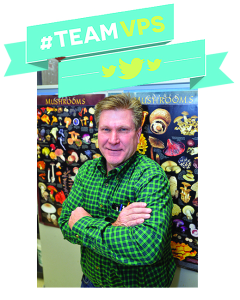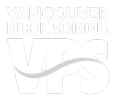First photo above, from left: Brittney Hauff, Cedric Hitzeman and Kasandra Wielenbeck show their mushrooms. Second photo: Wielenbeck, Hitzeman, Rep. Jaime Herrera Beutler, teacher Steve Lorenz and Hauff receive their award in Washington, D.C. Photo courtesy of Samsung.
“It was just a little side project that led to this big thing,” says Kasandra Wielenbeck, a senior in Hudson’s Bay High School’s Architecture, Construction and Environmental Services magnet program.
The little side project: Using mushroom mycelia to reclaim cardboard waste, produce edible mushrooms and create compost.
The big thing: A national win in the annual Samsung Solve for Tomorrow contest, which gives schools across the U.S. an opportunity to raise student interest in science, technology, engineering and math.

Learn more about horticulture teacher Steve Lorenz.
Wielenbeck and ACES senior Brittney Hauff and junior Cedric Hitzeman, working with veteran horticulture teacher Steve Lorenz, never expected to make it to the national phase, much less win the whole thing. Yet at every level of the competition, they consistently impressed with a former-studentcreated approach to recycling cardboard, which accounts for about 8 percent of the school’s total waste.
The cardboard is sorted, cut and sterilized in processing containers with a contaminant-killing iodine solution. After sterilization, it’s drained and allowed to dry before being inoculated with the mycelia of pearl oyster mushrooms. It then sits in the school’s indoor mycology lab for about six months as the mycelia take root and grow mushrooms.
The students hope eventually to sell the edible mushrooms, which typically retail for about $8 per pound.
The leftover cardboard waste is remediated further into a compost that also can be sold.
In a testament to the strength of their project, the Bay team, one of five national winners, received the sole Samsung Staff Choice Award. It also received a $120,000 technology grant, in addition to other prizes.
Students plan to focus on growing other mushroom varieties next year in a medium-scale operation, ideally one located outside to measure the impact of temperature fluctuations. Then, they envision the possibility of every VPS school housing a one-acre recycling facility.
“It worked well in small-scale testing, so it would be very easy to upscale and handle all of the schools’ paper waste,” Hitzeman explains.
And while the long-term benefits of winning the competition may be great, also great are some of the subtler outcomes.
With the team’s success, the students’ confidence and the ACES’ reputation have flourished. The win “got a lot of kids interested in coming to Bay for the ACES program and working in horticulture,” said Hitzeman.
Adds Hauff, “Horticulture is one of the best classes you can take, because it gives you a lot of opportunities.”
